We will take a look as below:
Function of Fast Fiber Connector;
different Types Fiber Connector and What they do;
How to Choose the Right Fast Fiber Connector;
How to Use Fiber Connector. Click here you can find more types connectors.
What Is the Function of Fast Fiber Connector?
Fast Fiber Connector is used to connect fiber optic cables to create a continuous optical patch. It has been widely used in optical fiber testing instruments, optical fiber distribution frames and optical fiber transmission.
Fiber Connector enable quick connection of fiber optic cables while maintaining proper alignment of fiber ends. It enables the fiber optic receiver to receive the most light from the transmitting fiber and minimizes system intervention due to the optical link. The stability and effectiveness of fiber optic transmission systems are affected to a certain extent by fiber optic connectors.
Fast Fiber Connector enable quick and easy field termination of single fibers. It provides complete cutting, precise alignment, elastic mounting, reliable fastening, etc., thereby reducing signal loss.
Types of Fast Fiber Connector - SC / LC / ST, FC and MTP
There are quite a lot of fast fiber connector types but the popularly used types are SC, LC and ST.
1.SC Fiber Connector
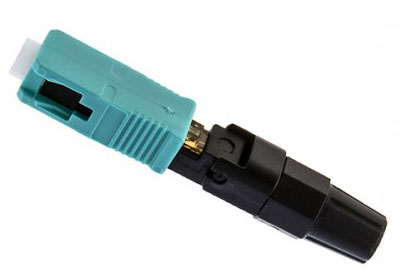
Square Connector popularly called SC is a split-in connector that fastens with a direct push-pull motion. It is called square connector because of its square-shaped connector body. It uses a ferrule that is 2.5mm in diameter, which is twice as big as the preceding LC connector. For Datacoms and Telecom applications, such as point-to-point and passive optical networking, the SC fiber optic connector is best suited. The fiber optic SC connector is still the second-most used connector for dissemination preserving applications due to its superior performance.
2.LC Fiber Connector
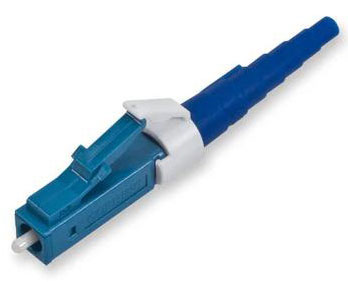
Lucent Connector mostly known as LC is a small form factor connector that has a 1.25 mm ferrule. They are better suited for high-density applications because of their insignificant footprint design which makes them common at datacoms. A lot of fibre engineers are migrating to LC due to their minute footprint designs and LC’s are now considered as the most used fast connector.
3.ST Fiber Connector
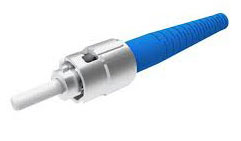
The Straight Tip (ST) Connector is an electroplate, ductile 2.5mm ferrule that is secured by a half-twist bayonet mount that locks the fiber in place. They are frequently installed in both long-distance and short-distance applications, including those involving multi-mode fiber in buildings and campus settings, business networks, and military settings.
(Compared to SC, LC, and ST Fast Fiber Optic Connector, FC and MTO/MTP Fiber Connector are less commonly used, but let’s take a brief look at them.)
4.FC Fiber Connector
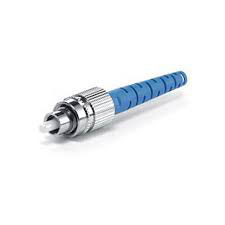
The Ferrule Connector called FC Connector uses threaded connection and is suitable for Single-Mode Optical Fiber or Polarization maintaining Fiber.Its shell length is usually 38.48mm and its diameter is generally about 10.80mm.FC fiber Connector has high connection reliability and is suitable for long-distance transmission.
5.MTO/MTP Fiber Connector
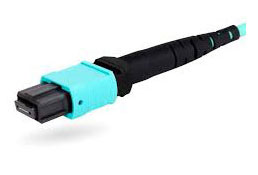
The Multi-fiber Push On / Termination Push-on connector(which called MTO/MTP Connector) designed with a guide pin fixing clip, which allows the MT ferrule to float within the outer frame,.This structure improving the mechanical performance.It is a Multi-core Fiber Optic Connector suitable for high-density data centers and communication applications.
How to Choose the Right Fast Fiber Connector you Require?
The type of fiber you are using and the equipment the fiber cable will be plugged into both affect the fiber connector style.
Step 1: Know the device you require
You can choose the type of connector to install if you know what equipment you'll be using. LC connectors are frequently utilized in high-density installations and are nearly solely employed in network applications.
Step 2: Know the fiber type
The fiber connector you uses is made exclusively for that type of fiber. The connector for single mode is designated as a 9/125 connector, where 9/125 stands for the optical fiber's core and 125/9 for its cladding. Either a 50/125 m (OM2/OM3/OM4) or 62.5/125 m (OM1) connector is needed for multi-mode fibers.
How to Use Fast Fiber Connector?
Before using fast fiber connectors, you should first strip the connector components apart to be able to correctly install the optical fibre.
Step 1: Stripping
Thread the optical fiber into the tail pipe after unscrewing the quick connection sub tail pipe. FTTH cable's PVC layer can be peeled off using a stripper while simultaneously being cut off at the stiffener. Then use the optical fiber stripper's lowest aperture to remove the coating.
Step 2: Cleaing
With an unknitted cloth bathed in anhydrous alcohol, wipe clean the exposed fiber.
Step 3: Cutting
Using the fiber optic cutter, cut the optical fiber and the optical fiber clamp together.
Step 4: Fast Connect
The optical fibre is inserted in to the fast connector.
Step 5: Testing
Checking the conduction state of the installed fibre and use the optical fiber test pen.